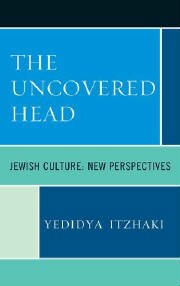The World’s Most Popular Book, Revisited 
By Yedidya Itzhaki
Translated by Nahum Steigman
This article is adapted from The Uncovered Head (University of Delaware; Rowman & Littlefield Publishing Group, Inc., 2011).
The argument has been made that there is no such thing as “secular Judaism,” that there are only “Torah-and-mitzvah [i.e. commandment] observant Jews” and “Jews who have thrown off the yoke of the Torah and mitzvoth.”
True, for centuries Judaism preserved a measure of unity as the religion of a single people, excluding any lifestyle that diverged too much from those formulated by its spiritual leaders. And yet despite this, Jewry has always contained a diversity of opinion—just as lifestyles have varied deeply between communities separated by geography and ethnicity. Jewry’s unity was never based upon uniformity.
Secular Jews, having no “Torah and mitzvoth” to structure the way of life they have chosen, should not be regarded as failing to observe the mitzvoth, but rather as having taken their “command” from elsewhere—from a humanist value system and from state law in the context of a sense of responsibility for the whole society. A secular worldview respects recognizes people’s right to be different. As I see it, the Jewish people—in all of its diversity—is united in its three-thousand-year-old culture, which in itself forms the predominant component of our identity.
At the root of that cultural identity, paradoxically enough, is the Bible. As the foundation and sovereign source of Jewish culture, the Bible (including texts inspired by it—i.e. the Talmud, Zohar, and midrashic, philosophical, and mystical commentary) constitutes what is known as the observant Jew’s bookcase. All the works included are mantled in sanctity by the belief that all were composed under divine inspiration in the spirit of holiness.
Yet solid evidence supports the position that they were composed by humans and declared sacred in order to put their authority beyond question. What is beyond question is that many of them are masterpieces and their cultural authority is immense. Also beyond question is the fact that they carry a message of great hope to humanity.
The potency of this message is, of course, that these works have so much to say to us that we would never think of belittling their value, but we read them with a critical eye, trying to understand them in the spirit of humanity, to absorb from them what is worth absorbing and leave aside what is not. Secular Jews treasure the Hebrew Bible as a cultural artifact of rare beauty and complex meaning but do not believe in the myths it contains. Similarly, they may admire the natural elements as aspects of faith for their originators. Mythologies are part of the culture of most peoples; they are devices by which the human spirit may symbolically represent its place in the universe. Secular Jews prefer the Hebrew myths because they belong to the origins of their culture, not because they contain any greater truth than those of other cultures.
This is true, too, of secular Jews’ approach to the biblical law that mythology ascribes to God. Without question, the biblical legal code, embodying ethical values previously unknown, was far ahead of its time. So, too, within limits, was much of its subsequent expansion. This is a matter of great pride. However, does it follow that today we must regulate ourselves by that law and its many interpreters and make it our daily practice?
At the very least, evaluating the sources of Judaism in the light of secular concepts cannot impair our Jewish identity to the slightest degree because that identity is neither rooted in the Jewish religion nor is it a product of it. It is rooted in the fundamentals of our Jewish culture—and Ahad Ha’am has already said all that is necessary on this point:
I know why I remain a Jew, or rather, I can find no meaning in such a question, any more than if I were asked why I remain my father's son.
Yedida Itzhaki is an architect as well as a researcher and lecturer in Hebrew literature and Jewish Studies at Bar Ilan University and at Zefat College in Israel. He is the author of The Concealed Verses: Intertextuality in the Work of A.B. Yehoshua and The Uncovered Head: Jewish Culture: New Perspectives (University of Delaware; Rowman & Littlefield Publishing Group, Inc. 2011), from which this article is adapted.To read further, visit the book's website.
This article is printed with the permission of the author and publisher and is protected by copyright. All rights reserved. Please contact the publisher for permission to copy, distribute or reprint.
|

|
 |
Related Articles...
Subversive and Sacred: From Belief in God to Belief in Conscience
By Alicia Ostriker
Losing Their Religion, A Review of David Biale's Not in the Heavens: The Tradition of Jewish Secular Thought
By Jesse Tisch
Epicurus' Jewish Legacy
By Yaacov Malkin

|
